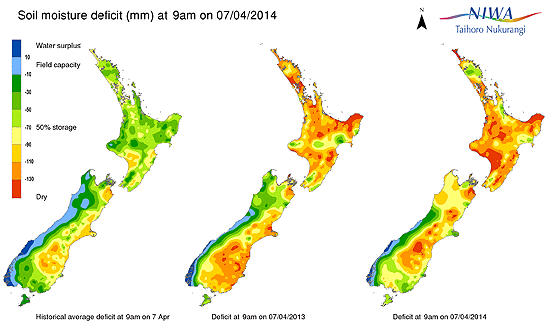
Here are the key things you need to know before you leave work today.
A MAJOR ANNOUNCEMENT DUE SOON
The hunt for MH370 may be coming to a climax. Aussies says black box signal found, according to Twitter reports.
QV DATA SHOWS SLOWING HOUSE PRICE GAINS
QV says annual house price growth slowed to 8.8% from 9.3% in the past month; the average price is now $466,700; Auckland prices were up 14.3%.
THERE WERE NO RATE CHANGES TODAY
None, zip, nada, not one for either mortgages or term deposits.
SIXTH QUARTER OF STRONG CONSUMER SPENDING
Paymark reports that March spending was strong, but with a later Easter this year maybe that masks a bit. "Strip out the supermarkets and petrol stations, and the annual growth rate for spending through the rest of the economy through Paymark was 5.9%, still a good growth rate but below the 6.5% annual average growth for these sectors over the previous six months," they said
A LOCAL YOUTH EMPLOYMENT INITIATIVE
Auckland mayor Len Brown is launching a youth employment program on Wednesday, so he says. It is rare to see such programs at the local body level.
FMA DEMANDS BETTER DISCLOSURE OF AUDITOR FEES
In a bit of irony, the FMA is wanting auditor remuneration better disclosed. CFOs will have a wry smile on this one.
WHOLESALE RATES
Swap rates have fallen quite noticeably today following the sell-off in New York post the NFP result. They are all down 3 and 4 bps except the one year term which is only down 1 bps. The 90 day bank bill rates is unchanged at 3.17%.
OUR CURRENCY
The NZ dollar has had a day off today trading virtually unchanged from where it ended in New York at the end of last week at 86.0 USc. It's at 92.6 AUc, and the TWI is at 80.3. Shanghai is on holiday today, so perhaps that explains some of the lethargy.

2 Comments
given recent post
"We have asked the select committee for a record of what was said at their recent meeting because it affects our business," Countdown communications manager Kate Porter told NZ Newswire.
this is worth a look
http://www.afr.com/p/business/how_supermarket_suppliers_can_thrive_DYa0…
The former chief executive of Kellogg’s Australia and New Zealand says Australian grocery suppliers face “suffocation” unless they adapt to a historic change in the business model of big retailers Woolworths and Coles.
Jean-Yves Heude said most grocery suppliers had been financing deeper and more frequent price promotions, facing tough price negotiations, losing volume to private label brands and struggling to recoup rising costs since Coles and Woolworths started to adopt a European-style retail model five years ago.
The model was inspired by the turnaround of the UK grocery chain Asda in the 1990s, and imported from Europe by the new management teams at Coles in 2009 and Woolworths in 2011.
“I’ve dealt with Tesco and Asda and when I came here and saw the changes starting, it was like deja vu,” says Heude, who was chief executive at Kellogg’s Australia and New Zealand from 2008 until last year.
Faced with flat volumes, rising costs and declining margins, most suppliers have been forced to rely on cutting costs to achieve targets or survive over the past five years.
..........
Suppliers also had to recognise that grocery buyers were using sophisticated negotiating and interrogation tactics – some new to Australia – designed to rattle and destabilise suppliers.
“There are many effective tactics, and I’ve seen or done a lot of them myself,” he says. “I have plenty of scars on my back.”
A few years before arriving in Australia, Heude was invited to a meeting by a big French retailer to exchange views about strategy. When he arrived, instead of one or two people, 14 representatives of the retailer were present. They threatened to take his products off the shelves, month by month, unless he agreed to better trading terms.
Rather than bowing to the pressure, Heude called their bluff. He quietly thanked the retailers for giving him the opportunity to discuss his strategy with so many of them and explained that he treated all his customers fairly and equitably, favouring none with preferential trading terms.
.....
Coles spruiked a rosy picture of the dairy industry at the height of the $1 milk wars last year using data it could not substantiate, the consumer watchdog has found.
The supermarket giant has conceded it relied on figures that could not be proven when it claimed that shaving the price of a two-litre milk container from $2.41 to $2 early last year would increase farm-gate prices for producers and lift national dairy production.
Coles has agreed to correct the claims, admitting to the Australian Competition and Consumer Commission that its social media advertising blitz “would be likely to have” breached consumer law that prohibits misleading and deceptive conduct.
Read more: http://www.smh.com.au/business/retail/milk-wars-coles-admits-to-errors-in-ad-campaign-20140407-368g2.html#ixzz2yBewwGSw

We welcome your comments below. If you are not already registered, please register to comment
Remember we welcome robust, respectful and insightful debate. We don't welcome abusive or defamatory comments and will de-register those repeatedly making such comments. Our current comment policy is here.